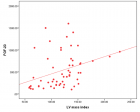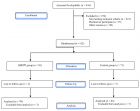Abstract
Perspective
Pets and Pediatrics, Friend and Foe: Companionship Masking Illnesses
Kennedy A Sabharwal* and Michael W Simon
Published: 08 March, 2024 | Volume 7 - Issue 1 | Pages: 013-015
Animals are companions that have continued to hold importance in the average American household. Traditional animals like dogs and cats are often treated as family members due to the human-animal bond. Although it seems as if there are many benefits to having animals in the home, it comes at a price—pet-borne illnesses. Compared to adults, the pediatric population is at a greater risk for these types of illnesses. Animals are natural reservoirs for many bacteria that may be passed to children, especially those who are immunocompromised. The goal of this article is to educate parents on the risks and symptoms of common pet-borne illnesses that are difficult to prevent from coming into the home.
Read Full Article HTML DOI: 10.29328/journal.japch.1001063 Cite this Article Read Full Article PDF
Keywords:
Pet-borne illness; Traditional pet; Non-traditional pet; Campylobacter jejuni; Clostroides difficile; Pasteurella; Toxoplasmosis gondii; Salmonella; Yersinia petis
References
- American Veterinary Medical Association.Assistance Animals and the Problem of Fraud. AVMA Public Policy/Animal Welfare. 2022.
- Powell L, Edwards KM, McGreevy P, Bauman A, Podberscek A, Neilly B, Sherrington C, Stamatakis E. Companion dog acquisition and mental well-being: a community-based three-arm controlled study. BMC Public Health. 2019 Nov 5;19(1):1428. doi: 10.1186/s12889-019-7770-5. PMID: 31684914; PMCID: PMC6829935.
- Purewal R, Christley R, Kordas K, Joinson C, Meints K, Gee N, Westgarth C. Companion Animals and Child/Adolescent Development: A Systematic Review of the Evidence. Int J Environ Res Public Health. 2017 Feb 27;14(3):234. doi: 10.3390/ijerph14030234. PMID: 28264460; PMCID: PMC5369070.
- PET industry data insights: Appa. Default. https://www.americanpetproducts.org/research-insights/appa-national-pet-owners-survey
- Mughini Gras L, Smid JH, Wagenaar JA, Koene MG, Havelaar AH, Friesema IH, French NP, Flemming C, Galson JD, Graziani C, Busani L, VAN Pelt W. Increased risk for Campylobacter jejuni and C. coli infection of pet origin in dog owners and evidence for genetic association between strains causing infection in humans and their pets. Epidemiol Infect. 2013 Dec;141(12):2526-35. doi: 10.1017/S0950268813000356. Epub 2013 Feb 28. PMID: 23445833; PMCID: PMC9151378.
- Ben-Shimol S, Carmi A, Greenberg D. Demographic and clinical characteristics of Campylobacter bacteremia in children with and without predisposing factors. Pediatr Infect Dis J. 2013 Nov;32(11):e414-8. doi: 10.1097/INF.0b013e31829baae0. PMID: 23694835.
- Centers for Disease Control and Prevention.Bartonella henselae or Cat Scratch Disease (CSD) faqs. Centers for Disease Control and Prevention. 2022, January 10. https://www.cdc.gov/bartonella/bartonella-henselae/faq.html
- Rodriguez C, Taminiau B, Bouchafa L, Romijn S, Van Broeck J, Delmée M, Clercx C, Daube G. Clostridium difficilebeyond stools: dog nasal discharge as a possible new vector of bacterial transmission. Heliyon. 2019 May 13;5(5):e01629. doi: 10.1016/j.heliyon.2019.e01629. Erratum in: Heliyon. 2019 Jun 14;5(6):e01890. PMID: 31193177; PMCID: PMC6520566.
- Furtado JM, Smith JR, Belfort R Jr, Gattey D, Winthrop KL. Toxoplasmosis: a global threat. J Glob Infect Dis. 2011 Jul;3(3):281-4. doi: 10.4103/0974-777X.83536. PMID: 21887062; PMCID: PMC3162817.
- Our other furry friends. American Veterinary Medical Association. https://www.avma.org/javma-news/2014-07-01/our-other-furry-friends
- Zoonoses: Dogs. UpToDate. https://www.uptodate.com/contents/zoonoses-dogs?search=yersinia++pestis++zoonoses+&source=search_result&selectedTitle=5~15&usage_type=default&display_rank=5
- Bula-Rudas FJ, Rathore MH, Maraqa NF. Salmonella Infections in Childhood. Adv Pediatr. 2015 Aug;62(1):29-58. doi: 10.1016/j.yapd.2015.04.005. PMID: 26205108.
- Mermin J, Hutwagner L, Vugia D, Shallow S, Daily P, Bender J, Koehler J, Marcus R, Angulo FJ; Emerging Infections Program FoodNet Working Group. Reptiles, amphibians, and human Salmonella infection: a population-based, case-control study. Clin Infect Dis. 2004 Apr 15;38 Suppl 3:S253-61. doi: 10.1086/381594. PMID: 15095197.
Figures:
Similar Articles
-
Pets and Pediatrics, Friend and Foe: Companionship Masking IllnessesKennedy A Sabharwal*, Michael W Simon. Pets and Pediatrics, Friend and Foe: Companionship Masking Illnesses. . 2024 doi: 10.29328/journal.japch.1001063; 7: 013-015
Recently Viewed
-
Agriculture High-Quality Development and NutritionZhongsheng Guo*. Agriculture High-Quality Development and Nutrition. Arch Food Nutr Sci. 2024: doi: 10.29328/journal.afns.1001060; 8: 038-040
-
A Low-cost High-throughput Targeted Sequencing for the Accurate Detection of Respiratory Tract PathogenChangyan Ju, Chengbosen Zhou, Zhezhi Deng, Jingwei Gao, Weizhao Jiang, Hanbing Zeng, Haiwei Huang, Yongxiang Duan, David X Deng*. A Low-cost High-throughput Targeted Sequencing for the Accurate Detection of Respiratory Tract Pathogen. Int J Clin Virol. 2024: doi: 10.29328/journal.ijcv.1001056; 8: 001-007
-
A Comparative Study of Metoprolol and Amlodipine on Mortality, Disability and Complication in Acute StrokeJayantee Kalita*,Dhiraj Kumar,Nagendra B Gutti,Sandeep K Gupta,Anadi Mishra,Vivek Singh. A Comparative Study of Metoprolol and Amlodipine on Mortality, Disability and Complication in Acute Stroke. J Neurosci Neurol Disord. 2025: doi: 10.29328/journal.jnnd.1001108; 9: 039-045
-
Development of qualitative GC MS method for simultaneous identification of PM-CCM a modified illicit drugs preparation and its modern-day application in drug-facilitated crimesBhagat Singh*,Satish R Nailkar,Chetansen A Bhadkambekar,Suneel Prajapati,Sukhminder Kaur. Development of qualitative GC MS method for simultaneous identification of PM-CCM a modified illicit drugs preparation and its modern-day application in drug-facilitated crimes. J Forensic Sci Res. 2023: doi: 10.29328/journal.jfsr.1001043; 7: 004-010
-
A Gateway to Metal Resistance: Bacterial Response to Heavy Metal Toxicity in the Biological EnvironmentLoai Aljerf*,Nuha AlMasri. A Gateway to Metal Resistance: Bacterial Response to Heavy Metal Toxicity in the Biological Environment. Ann Adv Chem. 2018: doi: 10.29328/journal.aac.1001012; 2: 032-044
Most Viewed
-
Evaluation of Biostimulants Based on Recovered Protein Hydrolysates from Animal By-products as Plant Growth EnhancersH Pérez-Aguilar*, M Lacruz-Asaro, F Arán-Ais. Evaluation of Biostimulants Based on Recovered Protein Hydrolysates from Animal By-products as Plant Growth Enhancers. J Plant Sci Phytopathol. 2023 doi: 10.29328/journal.jpsp.1001104; 7: 042-047
-
Sinonasal Myxoma Extending into the Orbit in a 4-Year Old: A Case PresentationJulian A Purrinos*, Ramzi Younis. Sinonasal Myxoma Extending into the Orbit in a 4-Year Old: A Case Presentation. Arch Case Rep. 2024 doi: 10.29328/journal.acr.1001099; 8: 075-077
-
Feasibility study of magnetic sensing for detecting single-neuron action potentialsDenis Tonini,Kai Wu,Renata Saha,Jian-Ping Wang*. Feasibility study of magnetic sensing for detecting single-neuron action potentials. Ann Biomed Sci Eng. 2022 doi: 10.29328/journal.abse.1001018; 6: 019-029
-
Pediatric Dysgerminoma: Unveiling a Rare Ovarian TumorFaten Limaiem*, Khalil Saffar, Ahmed Halouani. Pediatric Dysgerminoma: Unveiling a Rare Ovarian Tumor. Arch Case Rep. 2024 doi: 10.29328/journal.acr.1001087; 8: 010-013
-
Physical activity can change the physiological and psychological circumstances during COVID-19 pandemic: A narrative reviewKhashayar Maroufi*. Physical activity can change the physiological and psychological circumstances during COVID-19 pandemic: A narrative review. J Sports Med Ther. 2021 doi: 10.29328/journal.jsmt.1001051; 6: 001-007

HSPI: We're glad you're here. Please click "create a new Query" if you are a new visitor to our website and need further information from us.
If you are already a member of our network and need to keep track of any developments regarding a question you have already submitted, click "take me to my Query."



















































































































































